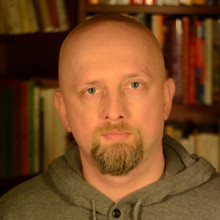Polish literature

Robert M. Wegner
(pen name) Polish fantasy author, living and working in Silesia, most known for award-winning series Opowieści z meekhańskiego pogranicza (Stories from the Meekhanian Frontier).
He made his debut in 2002 with the short story Ostatni lot Nocnego Kowboja (The Night Cowboy’s Last Flight) published in the nineteenth issue of the “Science Fiction” monthly (later retitled “Science Fiction, Fantasy & Horror”). Further stories from “SFF&H” were included in the collection Opowieści z meekhańskiego pogranicza. Północ-Południe (Stories from the Meekhanian Frontier. North and South) published by the Powergraph publishing house and set in the world of Meekhan that Wegner has been expanding since then. In the years 2010-2015 the same company published the next volumes of the cycle: Opowieści z meekhańskiego pogranicza. Wschód – Zachód (Stories from the Meekhanian Frontier. East and West, 2010), Niebo ze stali (The Steel Sky, 2012) and Pamięć wszystkich słów (The Memory of All Words, 2015) – the last two ones being full novels. Wegner’s cycle stands out in the field of Polish fantasy mostly through a skillful blending of fantastical world building with some subtle Slavic accents and a lively, dynamic style of narration. A website devoted to the Meekhan Empire and the world around it, meekhan.com, includes detailed descriptions of all the series’ volumes and a fictional map.
Robert Wegner is a two-time winner of the Jerzy Żuławski Literary Prize; in 2013 he received a silver prize for the novel Niebo ze stali and in 2016 another silver one for Pamięć wszystkich słów. The author is especially respected by science fiction and fantasy fans, who awarded him with the Janusz A. Zajdel Award five times He received it for the first time in 2009 for the short story Wszyscy jesteśmy Meekhańczykami (We’re All Meekhanians) from the series’ opening volume Opowieści z meekhańskiego pogranicza. Północ – Południe. In 2013, his novel Niebo ze stali and short story Jeszcze jeden bohater (One More Hero) from the Herosi (Heroes) anthology, also published by Powergraph. In 2016, another part of the series, Pamięć wszystkich słów, received the statue, as well as the short story Milczenie owcy (The Silence of the Lamb) – a retelling of the Wawel Dragon’s legend, co-published by Powergraph and Allegro in the free e-book Legendy polskie (Polish Legends), as part of the project also called Legendy polskie, on which the director Tomasz Bagiński and his studio Platige Image worked. Independently, Wegner’s story Najlepsze, jakie można kupić (The Best You Can Buy) from the volume Opowieści z meekhańskiego pogranicza. Wschód – Zachód received the Sphinx Award for the best short story during the 2011 International Fantasy and Science Fiction Festival in Nidzica. Wegner also received this award in 2013 for his novel Niebo ze stali. In 2014, during Eurocon in Dublin the European Science Fiction Society honored the writer with the ESFS Encouragement Award for promising European science fiction and fantasy writers. International awards the author received also include the Russian prizes for the translation of the Meekhanian cycle’s first tome published by AST, from FantLab’s Book of the Year Award to three awards from the esteemed “Mir Fantastiki” magazine: “Fantasy of the year”, “The book of the year” and “The reader’s book of the year”.
BIBLIOGRAPHY
short story collections and novels:
- Opowieści z meekhańskiego pogranicza. Północ-Południe, Warszawa: Powergraph ,2009, 2012 (seria „Fantastyka z Plusem”).
- Opowieści z meekhańskiego pogranicza. Wschód-Zachód, Warszawa: Powergraph, 2010, 2012 (seria „Fantastyka z Plusem”).
- Niebo ze stali. Opowieści z meekhańskiego pogranicza, Warszawa: Powergraph ,2012 (seria „Fantastyka z Plusem”).
- Pamięć wszystkich słów. Opowieści z meekhańskiego pogranicza, Warszawa: Powergraph, 2015 (seria „Fantastyka z Plusem”).
short stories:
- Ostatni lot nocnego kowboja, „Science Fiction” 2002, nr 9 (19).
- Bo kocham Cię nad życie, „Science Fiction, Fantasy i Horror”, nr 2 (5).
- Honor górala, „Science Fiction, Fantasy i Horror” 2006, nr 8 (11) (reprinted in the collection Opowieści z meekhańskiego pogranicza. Północ-Południe).
- Gdybym miała brata, „Science Fiction, Fantasy i Horror” 2007, nr 12 (26) (reprinted in the collection Opowieści z meekhańskiego pogranicza. Północ-Południe).
- I będziesz murem, „Science Fiction, Fantasy i Horror” 2007, nr 1 (15) (reprinted in the collection Opowieści z meekhańskiego pogranicza. Północ-Południe).
- Sen przedwiecznych, „Science Fiction, Fantasy i Horror” 2007, nr 3 (17).
- Przebudzenie, „Science Fiction, Fantasy i Horror” 2007, nr 4 (18).
- Światło na klindze miecza, „Science Fiction, Fantasy i Horror” 2007, nr 7 (21) (reprinted in the collection Opowieści z meekhańskiego pogranicza. Wschód-Zachód).
- Najpiękniejsza historia wszystkich czasów, w: Nowe idzie, red. Michał Cetnarowski, Warszawa: Powergraph 2008 (seria „Fantastyka z Plusem”).
- Wszystkie dzieci Barbie, „Science Fiction, Fantasy i Horror” 2008, nr 5 (31).
- Każdy dostanie swoją kozę, „Science Fiction, Fantasy i Horror” 2009, nr 3 (42).
- Jeszcze jeden bohater, w: Herosi, red. Michał Cetnarowski, Warszawa: Powergraph, 2012 (seria „Fantastyka z Plusem”).
- Milczenie owcy, w: Legendy polskie, red. Michał Cetnarowski, Warszawa: Powergraph/Allegro, 2015.
TRANSLATIONS
Russian:
- Сказания Меекханского пограничья: Север – Юг, transl. Siergiej Legieza, ACT, 2016.
- Сказания Меекханского Пограничья: Восток – Запад, transl. Siergiej Legieza ACT, 2016.
- Сказания Меекханского пограничья: Небо цвета стал, transl. Siergiej Legieza, ACT, 2017.
Czech:
- Sekera a skála, meč a žár: příběhy z meekhánského pohraničí sever-jih, transl. Pavel Weigel, Plzeň: Laser-books, 2011.
- Šíp a vítr, dýka a moře: příběhy z meekhánského pohraničí, transl. Pavel Weigel, Plzeň: Laser-books, 2013
The most important academic works devoted to Robert M. Wegner’s writing:
- Katarzyna Kaczor, Bogactwo polskich światów fantasy. Od braku nadziei ku eukatastrophe, w: Anatomia wyobraźni: 12 esejów o fantazjowaniu w kinie, telewizji, komiksach i literaturze popularnej, red. Sebastian Jakub Konefał, Gdańsk: Gdański Klub Fantastyki/Uniwersytet Gdański, 2014, s. 181-198.
- Piotr Stasiewicz, Między światami. Intertekstualność i postmodernizm w literaturze fantasy, Białystok: Wydawnictwo Uniwersytetu w Białymstoku 2016.
- Katarzyna Kaczor, Z „getta” do mainstreamu. Polskie pole literackie fantasy (1982-2012), Kraków: Universitas, 2017.